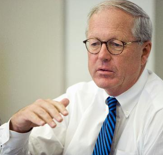
 I first met Jim Johnson in the early 1990’s. I was a great admirer of his predecessor at Fannie Mae, David Maxwell. David had recruited Jim from Lehman Brothers to serve as Vice-Chairman at Fannie Mae and then to succeed him as Chairman. After I left the Bush Administration and started The Hamilton Securities Group, I served on an advisory board at Fannie Mae, where I had a chance to better get to know Jim and Angelo Mozilo, Chairman of Countrywide Financial as well as numerous other leaders in the mortgage markets.
I first met Jim Johnson in the early 1990’s. I was a great admirer of his predecessor at Fannie Mae, David Maxwell. David had recruited Jim from Lehman Brothers to serve as Vice-Chairman at Fannie Mae and then to succeed him as Chairman. After I left the Bush Administration and started The Hamilton Securities Group, I served on an advisory board at Fannie Mae, where I had a chance to better get to know Jim and Angelo Mozilo, Chairman of Countrywide Financial as well as numerous other leaders in the mortgage markets.
If you had asked me to describe Jim at that time, I would have chosen words such as “intelligent, hard working, reliable, solid, thoughtful.” If you had asked me if I thought Jim Johnson saavy, I would have said “yes, very” although in a much deeper, more intelligent way than the people in Washingon that word is typically used to describe.
I have not seen Jim in years and, of course, people change. But it is difficult to think that time and millions of dollars could have turned Jim Johnson into an arrogant man. Jim amassed great personal wealth using taxpayer supported credit to help engineer a housing and mortgage bubble which has done extraordinary damage to millions of homeowners, communities and investors. So it was surprising to see Jim assume responsibility for vetting VP candidates for Obama without concern that the smell of his money might create controversy for the campaign.
Johnson did the smart thing by resigning. Nevertheless, we are left shaking our heads asking the question how someone this smart could so underestimate the depths of the anger throughout America and the world or the willingness of the various dirty players in Washington to connect the dots to take a swipe at Johnson and the Democratic candidate.
Pecunia non olet is a Latin saying, meaning “money has no smell.” It was one of those sayings I learned on Wall Street and heard countless times in Washington and Wall Street.
The expression is attributed to the Roman Emperor Vespasian. Wikipedia explains the history as follows. Vespasian reintroduced a urine tax on public toilets within Rome’s now famous Cloaca Maxima (great sewer) system. When his son Titus criticized him, he supposedly pointed out that a coin did not smell, even though it came from urine.
America’s financial history is a history of boom and busts. These cycles are historically tools of economic warfare by which the wealth of many is shifted into the hands of the few. If you look deep into the engineering, you will always find a “mutt and jeff” act of bad guys and good guys. You have the higher minded prestigous institutions such as the government sponsored enterprises who have the benefit of direct and indirect government guarantees — Fannie Mae, Freddie Mac, Ginnie Mae, the Federal Home Loan Bank Board — or the members and shareholders of the NY Federal Reserve Bank that serves as depository to the US government — JP Morgan Chase, Goldman Sachs (where Johnson serves on the board) and Citibank. No boom or bust can occur without their leadership. However, the scapegoats are typically the new, the younger, the entreprenurial such as Angelo Mozila who turned Countrywide into an overnight sensation.
Jim and Fannie Mae are the “Jeffs” of the housing bubble. Angelo and Countrywide are among the “Mutts.” Can we be hopeful this time around that the Jeff’s will not be able to shift the blame to the Mutts while they “re-legitimize” their money machine with candidates like Barack Obama?
It is too soon to tell. If the money behind both Democratic and Republican teams is put to the smell test, it will be quite challenging for either campaign or their funders to pass the test. With the US leading the globe in money laundering, covert operations and warfare, perhaps the time has indeed come to hold ourselves and each other accountable for the smell of our money.
